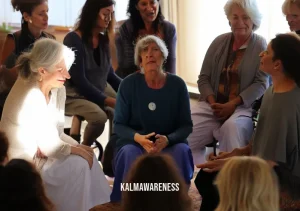Embracing Radical Kindness: A Journey Towards Compassion
Have you ever experienced an act of kindness so profound that it shifted your perspective on life? This is the essence of radical kindness. It’s more than just being nice; it’s a transformative approach to interacting with the world. Today, let’s dive into what it means and how it can reshape our mind and emotions.
What is Radical Kindness?
Radical kindness is a powerful, intentional practice. It goes beyond ordinary courteous acts; it’s about cultivating a deep sense of empathy and compassion, even in challenging situations. It involves:
- Understanding: Seeing the world through others’ eyes.
- Empathy: Connecting with others’ feelings.
- Action: Going out of your way to impact positively.
“Kindness can become its own motive. We are made kind by being kind.” – Eric Hoffer
This quote encapsulates the transformative nature of radical kindness. By practicing it, we not only change the lives of others but also enrich our own.
The Impact of Radical Kindness on Mind and Emotions
Radical kindness has a profound effect on our mental and emotional well-being. When we engage in acts of deep compassion, it triggers a positive feedback loop in our brain, releasing feel-good hormones like serotonin and dopamine. This not only uplifts our mood but also promotes a sense of connection and belonging.
- Reduces Stress and Anxiety: Being kind can be a therapeutic act. It helps in alleviating stress and anxiety. (Learn how meditation can help in easing anxiety)
- Builds Strong Relationships: Acts of kindness create stronger bonds and understanding. (Discover more about mindful relationship habits)
- Enhances Self-Esteem: When we help others, our own sense of self-worth and purpose increases.
How to Practice Radical Kindness?
- Start Small: Begin with small acts of kindness. A smile, a helping hand, or a listening ear can make a big difference.
- Be Mindful: Pay attention to the needs of those around you.
- Self-Compassion: Be kind to yourself. It’s challenging to extend kindness to others if you are hard on yourself.
Conclusion
Radical kindness is not just an act, but a lifestyle. It’s about being mindfully compassionate and transforming our approach to life. As we embark on this journey, remember, the seeds of compassion we plant today can blossom into a kinder, more empathetic world tomorrow.
Stay tuned for the next segment, where we’ll explore the barriers to practicing radical kindness and how to overcome them. Let’s continue our journey towards a more compassionate self and society.

Overcoming Barriers to Radical Kindness
In the first part of our journey, we explored the transformative power of radical kindness. Now, let’s delve into the common barriers that hinder its practice and how to overcome them, keeping our minds and emotions in focus.
Understanding the Barriers
The path to radical kindness isn’t always smooth. We often face internal and external obstacles that can make it challenging to maintain this compassionate approach. Some of these barriers include:
- Stress and Overwhelm: High levels of stress can make us more self-centered and less empathetic.
- Negative Biases: Prejudices and biases can hinder our ability to extend kindness indiscriminately.
- Lack of Awareness: Sometimes, we’re simply unaware of the opportunities to practice kindness.
“No act of kindness, no matter how small, is ever wasted.” – Aesop
This timeless quote reminds us that every act of kindness has value, even when faced with barriers.
The Power of Storytelling
Imagine Sarah, a young professional. Despite her busy schedule, she always finds time to offer a compassionate smile to her colleagues, lend an ear to a friend in need, or help a stranger. Her actions might seem small, but they create ripples of positivity, illustrating how overcoming barriers to kindness can deeply impact our surroundings.
Key Strategies to Embrace Radical Kindness
Here’s a table summarizing strategies to overcome these barriers:
| Barrier | Strategy |
|---|---|
| Stress and Overwhelm | Practice self-care and mindfulness. |
| Negative Biases | Cultivate empathy and understanding. |
| Lack of Awareness | Be mindful of your surroundings and actions. |
Implementing the Strategies
- Self-Care: It’s essential to be kind to ourselves. Engaging in self-care activities can reduce stress and enable us to extend kindness to others.
- Empathy Training: Actively challenge your biases and preconceptions. This can be achieved through empathy exercises or even simple acts like engaging in conversations with diverse groups.
- Mindful Living: By being more present, we can notice more opportunities to be kind. (Learn about mindfulness principles)
Conclusion and Transition
Radical kindness is not just an external act; it’s an internal transformation that begins with overcoming personal barriers. By adopting these strategies, we can foster a more compassionate self, ready to positively impact our world.
As we delve further into the power of radical kindness in the concluding segment, we’ll explore how this practice can lead to a more fulfilling and emotionally enriched life. Stay tuned for insights and tips on integrating radical kindness into your daily life for lasting impact.

Integrating Radical Kindness into Everyday Life
As we conclude our exploration of radical kindness, it’s essential to reflect on how this transformative practice can be woven into the fabric of our daily lives. Radical kindness, more than a concept, is an actionable path to emotional richness and a fulfilling life.
The Practical Applications of Radical Kindness
Radical kindness is not just about grand gestures; it’s in the small, everyday actions that we can truly make a difference. Here are practical ways to apply radical kindness in daily life:
- Active Listening: Be fully present in conversations, showing genuine interest in others’ thoughts and feelings.
- Volunteer Work: Giving your time to help others can be a powerful expression of compassion.
- Self-Compassion: Remember to be kind to yourself. Self-care is an essential aspect of being able to extend kindness to others.
“The simplest acts of kindness are by far more powerful than a thousand heads bowing in prayer.” – Mahatma Gandhi
This quote beautifully captures the essence of radical kindness as a simple yet powerful force.
Reinforcing Key Insights
Let’s summarize the key points from our journey:
- Understanding Radical Kindness: It’s about empathetic actions that go beyond standard courteous behaviors.
- Overcoming Barriers: Recognize and navigate through challenges like stress and negative biases to practice kindness.
- Everyday Practice: Implement kindness in daily actions, from listening attentively to volunteering and practicing self-compassion.
Encouraging Reflection and Action
- Reflect on how you can incorporate acts of kindness in your routine. What small changes can you make today?
- Think about the last time you experienced or witnessed an act of kindness. How did it make you feel?
Call to Action
We invite you to continue exploring the depths of kindness and compassion. Visit Kindness and Friendship and Dalai Lama’s 18 Rules for Living for more insights into living a life enriched with kindness.
Share your experiences and thoughts in the comments below. How has radical kindness impacted your life? Your stories can inspire and encourage others on their journey towards a kinder world.
Radical kindness is a journey, not a destination. It’s a continual practice that enriches our lives and the lives of those around us. As we strive to make kindness a radical part of our daily existence, we open doors to a world filled with empathy, understanding, and deep emotional connections. Let’s keep spreading kindness, one act at a time.




